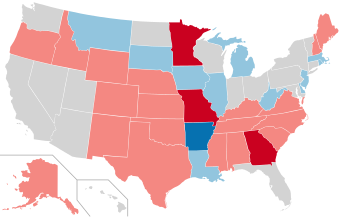|
2002 United States elections
The 2002 United States elections were held on November 5, in the middle of Republican President George W. Bush's first term. Republicans won unified control of Congress, picking up seats in both chambers of Congress, making Bush the first president since Franklin D. Roosevelt in 1934 to gain seats in both houses of Congress. In the gubernatorial elections, Democrats won a net gain of one seat. The elections were held just a little under fourteen months after the September 11 attacks. Thus, the elections were heavily overshadowed by the War on Terror. Republicans won a net gain of two seats in the Senate and so gained control of a chamber that they had lost in 2001 after Senator Jim Jeffords left the Republican Party. Republicans picked up eight seats in the House of Representatives, making this one of three mid-term elections in which the party of the incumbent president did not lose seats in either the House or the Senate (the other two being 1934 and 1998). It was the sixth midterm election in which the President's party increased its number of seats in the House, after 1814, 1822, 1902, 1934, and 1998. Along with the Senate elections of 1914, 1934, 1962, 1970, 2018, and 2022, this was the seventh of eight times that the President's party gained seats in a midterm election since the passage of the 17th Amendment. This is the only election in history where the president's party gained a chamber of Congress in a midterm election, the most recent midterm in which the president's party did not lose control of at least one house of Congress, and the most recent midterm election in which a political party maintained a trifecta on the government. Federal electionsDespite being the incumbent party in the White House, which is usually a disadvantage for the president's party during midterm congressional elections, Republicans achieved gains in both chambers of the United States Congress. United States Senate electionsDuring the 2002 U.S. Senate elections, all thirty-three regularly scheduled Class II Senate seats as well as a special election in Missouri were held. In the end, the Republican Party achieved an overall net gain of two seats with victories in Georgia, Minnesota, and Missouri, while the Democrats took a seat in Arkansas. Thus, the balance of power in the Senate changed from a 51–49 Democratic majority to a 51–49 Republican majority. United States House of Representatives electionsDuring the 2002 House elections, all 435 seats in the House of Representatives plus 5 of the 6 nonvoting delegates from territories and the District of Columbia were up for election that year. These elections were the first to be held following redistricting in apportionment according to the 2000 United States census. Republicans succeeded in expanding their majority in the House of Representatives by a net gain of eight, resulting in a 229–204 Republican majority. They won the nationwide popular vote by a margin of 4.8 points.[1] This represented just the third time since the American Civil War that the president's party picked up seats in the House of Representatives, following the 1934 and 1998 elections.[2] In addition to all regularly scheduled House elections, there were two special elections held, one for Oklahoma's 1st congressional district on January 8 and another for Hawaii's 2nd congressional district on November 30. State electionsGubernatorial electionsDuring the 2002 gubernatorial elections, the governorships of the 36 states, 2 territories, and the District of Columbia were up for election. Going into the elections, Republicans held the governorships of 27 states and one territory (that being the Northern Mariana Islands); Democrats held those of twenty-one states, four territories, and the mayorship of the District of Columbia; and two governorships were held by incumbents of neither party (those being Angus King (I-Me.) and Jesse Ventura (IPM-Minn.)). Following the elections, Republicans sustained a net loss of one state governorship (but did gain the governorship of the territory of Guam); Democrats had an overall net gain of three state governorships and held on to all other territorial governorships and the mayorship of the District of Columbia; and there would be no governorships held by independents or third parties. Thus, the balance of power (excluding nonstate entities) would change from a 27–21 Republican majority to a 26–24 Republican majority. Other statewide electionsIn some states where the positions were elective offices, voters elected candidates for state executive-branch offices (lieutenant governor (though some were elected on the same ticket as the gubernatorial nominee); secretary of state; state treasurer; state auditor; state attorney general; state superintendent of education; commissioner of insurance, agriculture, or labor; etc.) and state judicial-branch offices (seats on state supreme courts and, in some states, state appellate courts). State legislative electionsIn 2002, the seats of the legislatures of forty-six states and five nonstate entities were up for election. Republicans flipped control of six chambers: the Colorado Senate, the Georgia Senate for the first time since 1870, the Missouri House of Representatives for the first time since 1955, the Texas House of Representatives for the first time since 1873, the Washington Senate, and the Wisconsin Senate. Meanwhile, Democrats flipped control of the Illinois Senate. Additionally, the Arizona Senate went from a Democratic-led coalition to Republican control. The Maine Senate went from an evenly divided power-sharing government to a Democratic one. while the Oregon Senate went from Republican to tied. Republicans had initially won control of the North Carolina House of Representatives by one seat, but Republican Michael P. Decker switched parties to become a Democrat, producing a tied chamber.[3] As a result, Republicans held a majority of state legislative seats for the first time in half a century.[4] Local electionsNationwide, there were some cities, counties, school boards, special districts and others that elected members in 2002. Mayoral electionsVarious major American cities held their mayoral elections in 2002, including the following:
References
External links
|
||||||||||||||||||||||||||||||||||||||||||||||||


